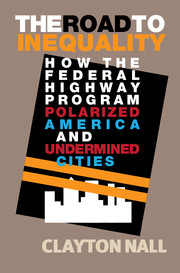Crossref Citations
This Book has been
cited by the following publications. This list is generated based on data provided by Crossref.
Trounstine, Jessica
2018.
Segregation by Design.
Stone, Clarence N.
2019.
V. O. Key Goes Urban: Toward Understanding a Changing Political Order.
Urban Affairs Review,
Vol. 55,
Issue. 6,
p.
1515.
TROUNSTINE, JESSICA
2020.
The Geography of Inequality: How Land Use Regulation Produces Segregation.
American Political Science Review,
Vol. 114,
Issue. 2,
p.
443.
Curiel, J.A.
Sanders, A.E.
and
Slade, G.D.
2020.
Emulation of Community Water Fluoridation Coverage Across US Counties.
JDR Clinical & Translational Research,
Vol. 5,
Issue. 4,
p.
376.
Jensen, Amalie
Marble, William
Scheve, Kenneth
and
Slaughter, Matthew J.
2021.
City limits to partisan polarization in the American public.
Political Science Research and Methods,
Vol. 9,
Issue. 2,
p.
223.
Mendelberg, Tali
Mérola, Vittorio
Raychaudhuri, Tanika
and
Thal, Adam
2021.
When Poor Students Attend Rich Schools: Do Affluent Social Environments Increase or Decrease Participation?.
Perspectives on Politics,
Vol. 19,
Issue. 3,
p.
807.
Hacker, Jacob S.
Hertel-Fernandez, Alexander
Pierson, Paul
and
Thelen, Kathleen
2021.
The American Political Economy.
An, Brian Y.
and
Bostic, Raphael W.
2021.
What Determines Where Public Investment Goes? Regional Governance and the Role of Institutional Rules and Power.
Public Administration Review,
Vol. 81,
Issue. 1,
p.
64.
Berry, Justin A.
Ebner, David
and
Cornelius, Michelle
2021.
White identity politics: linked fate and political participation.
Politics, Groups, and Identities,
Vol. 9,
Issue. 3,
p.
519.
Curiel, John A.
and
Clark, Jesse T.
2021.
Disparities in Poll Closures in the Age of COVID-19: A Case Study of Wisconsin.
Election Law Journal: Rules, Politics, and Policy,
Vol. 20,
Issue. 4,
p.
345.
Pablo-Martí, Federico
Alañón-Pardo, Ángel
and
Sánchez, Angel
2021.
Complex networks to understand the past: the case of roads in Bourbon Spain.
Cliometrica,
Vol. 15,
Issue. 3,
p.
477.
DeWitt, Darin
2021.
Time allocation across the Senate election cycle.
The Journal of Legislative Studies,
Vol. 27,
Issue. 1,
p.
73.
Klein, Nicholas J.
Ralph, Kelcie
Thigpen, Calvin
and
Brown, Anne
2022.
Political Partisanship and Transportation Reform.
Journal of the American Planning Association,
Vol. 88,
Issue. 2,
p.
163.
Spater, Jeremy
2022.
Exposure and Preferences: Evidence from Indian Slums.
American Journal of Political Science,
Vol. 66,
Issue. 2,
p.
302.
Cermeño, Alexandra L.
Enflo, Kerstin
and
Lindvall, Johannes
2022.
Railroads and Reform: How Trains Strengthened the Nation State.
British Journal of Political Science,
Vol. 52,
Issue. 2,
p.
715.
Lindvall, Johannes
2022.
Political science as architecture.
European Political Science,
Vol. 21,
Issue. 4,
p.
550.
Kuffuor, Owura
Visconti, Giancarlo
and
Young, Kayla M
2022.
Constructing generalizable geographic natural experiments.
Research & Politics,
Vol. 9,
Issue. 3,
p.
205316802211137.
Clark, Jesse T.
Curiel, John A.
and
Steelman, Tyler S.
2022.
Minmaxing of Bayesian Improved Surname Geocoding and Geography Level Ups in Predicting Race.
Political Analysis,
Vol. 30,
Issue. 3,
p.
456.
Rogowski, Jon C.
Gerring, John
Maguire, Matthew
and
Cojocaru, Lee
2022.
Public Infrastructure and Economic Development: Evidence from Postal Systems.
American Journal of Political Science,
Vol. 66,
Issue. 4,
p.
885.
Yarbrough, Collin
and
Smith-Colin, Janille
2023.
Different journeys, same struggle: practitioner experiences in environmental justice policy, assessment, and decision-making.
Transportation,





